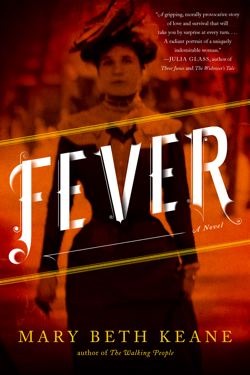Title: Fever
Author: Mary Beth Keane
Format: Hardcover
Publisher: Scribner
Publish Date: March 12, 2013
Source: Owned
What's the Story?:
From Goodreads.com: "On the eve of the
twentieth century, Mary Mallon emigrated from Ireland at age fifteen to
make her way in New York City. Brave, headstrong, and dreaming of being a
cook, she fought to climb up from the lowest rung of the
domestic-service ladder. Canny and enterprising, she worked her way to
the kitchen, and discovered in herself the true talent of a chef. Sought
after by New York aristocracy, and with an independence rare for a
woman of the time, she seemed to have achieved the life she'd aimed for
when she arrived in Castle Garden. Then one determined medical engineer
noticed that she left a trail of disease wherever she cooked, and
identified her as an "asymptomatic carrier" of Typhoid Fever. With this
seemingly preposterous theory, he made Mallon a hunted woman.
The
Department of Health sent Mallon to North Brother Island, where she was
kept in isolation from 1907 to 1910, then released under the condition
that she never work as a cook again. Yet for Mary, proud of her former
status and passionate about cooking, the alternatives were abhorrent.
She defied the edict."
My Two Cents:
Many of us history lovers
have heard the story of Typhoid Mary but not many of us really know her
story. In this book, Mary Beth Keane brings her story to life. Mary was a
hardworking Irish woman who wanted to make her life being a cook for
some of the fancy homes in her area. She found many good jobs but her
dreams are crushed when it is found that although she does not have
symptoms of typhoid fever, she can pass it on and she happens to pass it
on through her food. Some believe that she is a public health hazard
and must be stopped without any regard for her own health or happiness.
This
was a really hard book to read in some places. It seems like Mary was
punished in a lot of ways even though there really was not anything she
could do about being a carrier of typhoid fever. She gets that but those
in charge of public health don't get it at all. I really felt bad for
her. It was interesting to me to see how the public in general felt
about diseases and how the doctors did not really understand how to
prevent diseases or help people with said diseases. I really felt for
Mary. She ends up not being able to live a really full life because of
the typhoid.
This story also explores the issues of Mary both
being a woman and an immigrant. The book makes the case for Mary
receiving a lot of the bad treatment that she receives because of her
being a woman and an unmarried woman at that. She had tried to rise
above her station in life and was thwarted at every turn. There was also
the issue of her being Irish. Back during the early 1900s, the Irish
immigrants coming to this country wer not well respected at all. They
were treated as less than other people. I thought it was really
fascinating how the author chose to tackle both issues.
This book was a very interesting read with a very memorable character.



I'm a big fan of historical fiction and am keen to read this one. Glad you enjoyed it :)
ReplyDeleteThisone sounds intesting. I know a little about Typhoid Mary, not much detail. I'm adding this to my never-ending list!
ReplyDelete